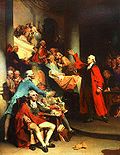Cross posted from The Stars Hollow Gazette
I’m proud to be here as you host World Press Freedom Day. So everybody from the American press corps, you should thank the people of Costa Rica for celebrating free speech and an independent press as essential pillars of our democracy.
~President Obama
Remarks by President Obama and President Chinchilla of Costa Rica in a Joint Press Conference, in National Center for Art and Culture San Jose, Costa Rica, 10 days ago.
That was so ten days ago. The news broke that Obama Department of Justice had secretly seized two months of phone records of the Associated Press reporters and editors.
The government would not say why it sought the records. Officials have previously said in public testimony that the U.S. attorney in Washington is conducting a criminal investigation into who may have provided information contained in a May 7, 2012, AP story about a foiled terror plot. The story disclosed details of a CIA operation in Yemen that stopped an al-Qaida plot in the spring of 2012 to detonate a bomb on an airplane bound for the United States.
In testimony in February, CIA Director John Brennan noted that the FBI had questioned him about whether he was AP’s source, which he denied. He called the release of the information to the media about the terror plot an “unauthorized and dangerous disclosure of classified information.”
Prosecutors have sought phone records from reporters before, but the seizure of records from such a wide array of AP offices, including general AP switchboards numbers and an office-wide shared fax line, is unusual.
The president and CEO of AP, Gary Pruitt sent a letter protesting the “massive and unprecedented intrusion” (pdf):
Last Friday afternoon, AP General Counsel Laura Malone received a letter from the office of United States Attorney Ronald C. Machen Jr. advising that, at some unidentified time earlier this year, the Department obtained telephone toll records for more than 20 separate telephone lines assigned to the AP and its journalists. The records that were secretly obtained cover a full two-month period in early 2012 and, at least as described in Mr. Machen’s letter, include all such records for, among other phone lines, an AP general phone number in New York City as well as AP bureaus in New York City, Washington, D.C., Hartford, Connecticut, and at the House of Representatives. This action was taken without advance notice to AP or to any of the affected journalists, and even after the fact no notice has been sent to individual journalists whose home phones and cell phone records were seized by the Department.
There can be no possible justification for such an overbroad collection of the telephone communications of The Associated Press and its reporters. These records potentially reveal communications with confidential sources across all of the newsgathering activities undertaken by the AP during a two month period, provide a road map to AP’s newsgathering operations, and disclose information about AP’s activities and operations that the government has no conceivable right to know.(my emphasis)
h/t to Marcy Wheeler who points out the two months, April to May of 2012, that were of interest covered the period that, now CIA Director, John Brennan had rolled out his drone propaganda campaign:
That would mean they’d get the sources for this Kimberly Dozier story published May 21 [..]
Within 10 days of the time Dozier published that story, John Brennan had rolled out an enormous propaganda campaign – based on descriptions of the drone targeting process that Brennan’s power grab had replaced, not the new drone targeting process – that suckered almost everyone commenting on drones that drone targeting retained its previous, more deliberative, targeting process, the one Brennan had just changed.
And that propaganda campaign, in turn, hid another apparent detail: that UndieBomb 2.0, a Saudi sting had actually occurred earlier in April, and that UndieBomb 2.0 preceded and perhaps justified the signature strikes done at the behest of the Yemenis (or more likely the Saudis).
Marcy listed the timeline of the AP stories that were focused on Brennan and the undie bomber. However, it was after the Dozier story that Brennan began his propaganda campaign to cover up how illegal and uncontrollable the drone program is.
Comparing this to Nixon and Watergate, Charles P. Pierce goes full throttle on why Eric Holder should be fired:
This isn’t hard. This is what made Egil (Bud) Krogh famous. This is what got people sent to jail in the mid-1970’s. This is the Plumbers, all over again, except slightly more formal this time, and laundered, disgracefully, even more directly through the Department Of Justice. And of course, this is not nearly good enough. And even if you point out, as you should, that the AP is hyping this story a little — The government “secretly” obtained the records? Doesn’t that imply that nobody knew the records had been seized? Wasn’t there a subpoena? The phone companies knew. — the ignoble clumsiness of this more than obviates those particular quibbles.
The White House on Monday said that other than press reports it had no knowledge of Justice Department attempts to seek AP phone records. “We are not involved in decisions made in connection with criminal investigations, as those matters are handled independently by the Justice Department,” spokesman Jay Carney said.
That is all my arse. At the least, this was a counter-terrorism operation. (Why else would Brennan have been questioned already?). Which puts the whole business inside the White House. And you’d have to be a toddler or a fool to believe that Eric Holder could go off on his own and take as politically volatile a step as this. But, let us take the White House at its word. Eric Holder did this by himself. He should be gone. This moment. Not only is this constitutionally abhorrent, it is politically moronic. Nobody likes the press, I will grant you that, but the administration is soft if it thinks the public distrusts the press that much. And to have this genuinely chilling revelation emerge simultaneously with the Benghazi, Benghazi!, BENGHAZI! mummery and the IRS dumbassery is pretty much a full broadside below the water line of this administration’s credibility. Good god, this is going to be one long-ass summer.
Pres. Obama needs to do damage control starting with throwing Holder to the wolves. I suspect this will be the next congressional investigation in an effort to not just derail Hillary Clinton’s 2016 campaign but to build a case for impeachment of Obama for abuse of his executive powers. A long hot summer, indeed.




